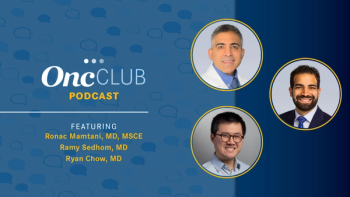
Roychowdhury Relays Impact of Recent Infigratinib Approval in FGFR+ Cholangiocarcinoma
Sameek Roychowdhury, MD, PhD, discusses the pivotal phase 2 trial with infigratinib in FGFR-positive cholangiocarcinoma, the safety and efficacy achieved with infigratinib, and the next steps for this agent.
Welcome to OncLive On Air®! I’m your host today, Kristi Rosa.
OncLive On Air® is a podcast from OncLive®, which provides oncology professionals with the resources and information they need to provide the best patient care. In both digital and print formats, OncLive® covers every angle of oncology practice, from new technology to treatment advances to important regulatory decisions.
In today’s episode, we had the pleasure of speaking with Sameek Roychowdhury, MD, PhD, a medical oncologist and an assistant professor in the Department of Internal Medicine and the Department of Pharmacology at The Ohio State University.
Therapeutic options are sparse for patients with advanced cholangiocarcinoma following progression on first-line gemcitabine-based therapy. Moreover, 10% to 16% of patients with intrahepatic cholangiocarcinoma harbor FGFR2 fusions or rearrangements. The FDA has issued accelerated approvals for FGFR inhibitors such as erdafitinib (Balversa) and pemigatinib (Pemazyre) for use in this population. In April 2021, the agency granted a breakthrough therapy designation to a third FGFR inhibitor, futibatinib.
In May 2021, the FDA gave the green light to infigratinib, a selective, ATP-competitive inhibitor of FGFR, for the treatment of patients with previously treated locally advanced or metastatic cholangiocarcinoma harboring a FGFR2 fusion or rearrangement. The regulatory decision is based on data from a pivotal phase 2 trial, which showed that a median follow-up of 10.6 months, the blinded independent central review–assessed objective response rate with the agent was 23.1% (95% CI, 15.6%-32.2%); this included 1 complete response (1%) and 24 partial responses (22%).
In our exclusive interview, Roychowdhury further discussed the phase 2 trial, the safety and efficacy achieved with infigratinib, and the next steps for this agent.
Check back on Mondays and Thursdays for exclusive interviews with leading experts in the oncology field.
For more updates in oncology, be sure to visit www.OncLive.com and sign up for our e-newsletters.
OncLive is also on social media. On Twitter, follow us at @OncLive and @OncLiveSOSS. On Facebook, like us at OncLive and OncLive State of the Science Summit and follow our OncLive page on LinkedIn.
If you liked today’s episode of OncLive On Air®, please consider subscribing to our podcast on Apple Podcasts, Spotify, Google Podcasts, Amazon Music, and many of your other favorite podcast platforms,* so you get a notification every time a new episode is posted. While you are there, please take a moment to rate us!
Thanks again for listening to OncLive On Air®.






































